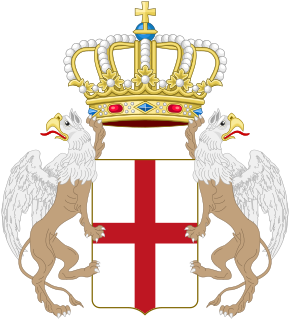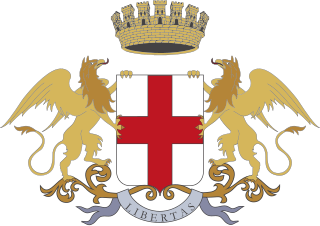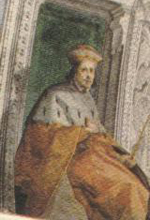Antoniotto is a given name and a surname. Notable people with this name include the following:

The Doge of Genoa was the ruler of the Republic of Genoa, a city-state and soon afterwards a maritime republic, from 1339 until the state's extinction in 1797. Originally elected for life, after 1528 the Doges were elected for terms of two years. In actuality, the Republic was an oligarchy ruled by a small group of merchant families, from whom the doges were selected.

The Adorno family was a noble family of the Republic of Genoa, with the branches of Botta in Milan, several of whom were Doges of the republic.
The family is considered one of the most influential in the history of the republic.
Botta is a surname. People with this surname can be found in Brazil and in the southern Indian state of Andhra Pradesh. Notable people with the surname include:
Antonio de Noli was a 15th-century Genoese nobleman and navigator, and the first governor of the earliest European overseas colony in Subsaharan Africa. He discovered some of the Cape Verde islands on behalf of Henry the Navigator and he was made first Governor of Cape Verde by King Afonso V. In most history or geographic books, including ancient chronicles, or encyclopedias, he is referred as Antonio de Noli, as well as in official information by the Government of Cape Verde or in Cape Verde history articles or references. In Italy, he is known also as Antonio da Noli or sometimes referred as Antoniotto Usodimare.
Adorno is a surname.
Valentino may refer to

Antoniotto Botta Adorno, also Anton Otto Marchese Botta d'Adorno was a high officer of the Habsburg monarchy and a plenipotentiary of the Austrian Netherlands.
Giorgio Antoniotto, (1680–1766), was an Italian musician, who is noted as the author of a musical treatise, L’arte armonica, and as an early composer of music for violoncello.

Antoniotto II Adorno was Doge of the Republic of Genoa from 1522 to 1527. Adorno was the last of the Genoese doges elected for life.

Antoniotto di Montaldo was the doge of Genoa on two occasions between 1392 and 1394.

Domenico di Campofregoso (1325–1390) was the fifth doge of Genoa. He succeeded Gabriele Adorno upon the deposition of the latter on August 13, 1370 by the two vicars of the people. He held the longest consecutive term as Doge in the history of the Republic.

The Most Serene Prince Antoniotto Adorno was the 6th doge of the Republic of Genoa and rose four times to this supposedly lifelong position, making him the person most often elected to the Doge office in the history of the republic.

Nicolò Guarco was a Genoese statesman who became the 7th doge of the Republic of Genoa and led the Republic through the War of Chioggia against Venice.
William Angus may refer to:

The Fregoso or di Campofregoso were a noble family of the Republic of Genoa and Liguria in general, divided into numerous branches, whose members distinguished themselves on numerous historical occasions; many of them held the position of Doge of Genoa, some were also lords of Sarzana; others finally held various fiefdoms, lands and titles along the arc of the Ligurian Apennines, such as the county of Sant'Agata Feltria which was owned by Agostino Fregoso. The Fregoso family monopolized the Dogate's lifetime office, becoming the dynasty who produced the highest number of doges in the history of the Republic.
Giovanni Carlo is a blended masculine given name that combines Giovanni and Carlo that is often shortened to Gian Carlo, Giancarlo, or Gian-Carlo. Notable people with this name include the following:
Gianantonio is an Italian masculine blended given name that is a combination of Gianni and Antonio. Notable people known by this name include the following:
Giannantonio is an Italian masculine blended given name that is a combination of Gianni and Antonio. Notable people known by this name include the following:
Edmund Stafford may refer to:
Antoniotto Adorno may refer to the following: